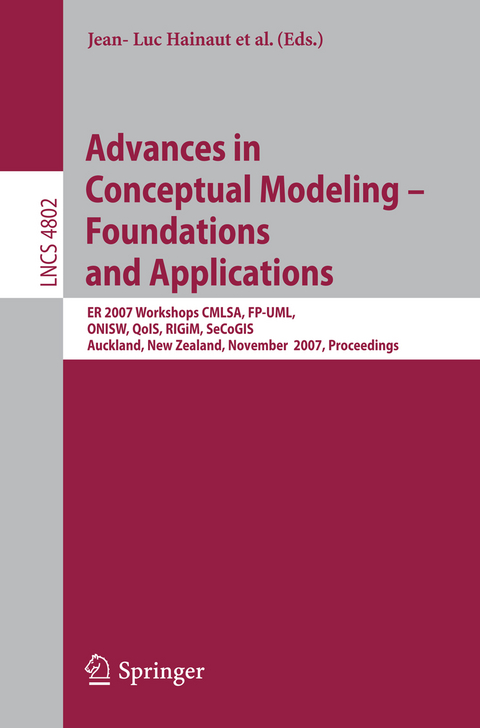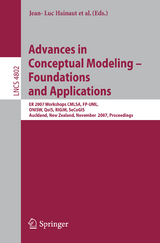Advances in Conceptual Modeling - Foundations and Applications
Springer Berlin (Verlag)
978-3-540-76291-1 (ISBN)
CMLSA 2007 - International Workshop on Conceptual Modelling for Life Sciences Applications.- Preface to CMLSA 2007.- Knowledge Discovery in Life Sciences.- Pattern Recognition of Single-Molecule Force Spectroscopy Data.- Massive Protein Structural Property Explorations Using New Indexing Mechanism.- Data Integration and Exchange in Health Informatics.- Data Access and Management in ACGT: Tools to Solve Syntactic and Semantic Heterogeneities Between Clinical and Image Databases.- Ontology-Based Data Integration in Data Logistics Workflows.- Model-Driven Development Based Transformation of Stereotyped Class Diagrams to XML Schemas in a Healthcare Context.- Conceptual Modelling for Biological Systems.- An Extendable System for Conceptual Modeling and Simulation of Signal Transduction Pathways.- Toward an Ontological Database for Subcellular Neuroanatomy.- Seed-Based Generation of Personalized Bio-ontologies for Information Extraction.- FP-UML 2007 - International Workshop on Foundations and Practices of UML.- Preface to FP-UML 2007.- Improving the Use of UML Diagrams.- Developing State Diagrams Using a State Specialization Technique.- Quality Dependencies Among Use Case Models and Sequence Diagrams Developed by Novice Systems Analysts.- M-BPSec: A Method for Security Requirement Elicitation from a UML 2.0 Business Process Specification.- Model Transformations and Extensions.- Applying Model Transformation By-Example on Business Process Modeling Languages.- Extending OCL to Ensure Model Transformations.- A UML Profile for Modeling Data Warehouse Usage.- ONISW 2007 - InternationalWorkshop on Ontologies and Information Systems for the Semantic Web.- Preface to ONISW 2007.- A Method for Semi-automatic Creation of Ontologies Based on Texts.- Enriching OWL with InstanceRecognition Semantics for Automated Semantic Annotation.- Making Web Users' Domain Models Explicit by Applying Ontologies.- Provability-Based Semantic Interoperability Via Translation Graphs.- QoIS 2007 - International Workshop on Quality of Information Systems.- Preface to QoIS 2007.- PQM vs. BPQM: Studying the Tailoring of a General Quality Model to a Specific Domain.- An Ontological Approach for the Quality Assessment of Computer Science Conferences.- Using Practitioners for Assessing the Understandability of UML Statechart Diagrams with Composite States.- RIGiM 2007 - International Workshop on Requirements, Intentions and Goals in Conceptual Modelling.- Preface to RIGiM 2007.- Keynote.- An Ontology for Requirements.- Requirements and Goals - Methods.- GOORE : Goal-Oriented and Ontology Driven Requirements Elicitation Method.- Early Prioritisation of Goals.- Goal-Aligned Requirements Generation.- A Model-Driven Goal-Oriented Requirement Engineering Approach for Data Warehouses.- Visually Effective Goal Models Using KAOS.- Agent Based Executable Conceptual Models Using i* and CASO.- Requirements and Goals - Concepts.- Achieving, Satisficing, and Excelling.- On the Adequacy of i* Models for Representing and Analyzing Software Architectures.- Extending Argumentation to Goal-Oriented Requirements Engineering.- SeCoGIS 2007 - International Workshop on Semantic and Conceptual Issues in Geographic Information Systems.- Preface to SeCoGIS 2007.- Moving Objects.- Modeling Historical and Future Spatio-temporal Relationships of Moving Objects in Databases.- Towards a Semantic Spatial Model for Pedestrian Indoor Navigation.- Modeling Collaborative Semantics with a Geographic Recommender.- Dynamically Traveling Web Service Clustering Based on Spatial and TemporalAspects.- Advances in Conceptual Modelling for GIS.- A Graph-Oriented Model and Query Language for Events.- PLR Partitions: A Conceptual Model of Maps.- A Conceptual Framework to Support Semantic Interoperability of Geospatial Datacubes.- Integrity Constraints and Approximate Reasoning.- On Languages for the Specification of Integrity Constraints in Spatial Conceptual Models.- Approximate Queries by Relaxing Structural Constraints in GIS.- Ensuring the Semantic Correctness of Complex Regions.
| Erscheint lt. Verlag | 15.10.2007 |
|---|---|
| Reihe/Serie | Information Systems and Applications, incl. Internet/Web, and HCI | Lecture Notes in Computer Science |
| Zusatzinfo | XIX, 424 p. With online files/update. |
| Verlagsort | Berlin |
| Sprache | englisch |
| Maße | 155 x 235 mm |
| Gewicht | 667 g |
| Themenwelt | Informatik ► Theorie / Studium ► Algorithmen |
| Mathematik / Informatik ► Informatik ► Web / Internet | |
| Schlagworte | Agent Systems • Architecture • Association Rules • business process models • Cognition • conceptual modeling • Database • Database Integration • data integration • Data Mining • E-Business • ER • geographic databases • GIS • Hardcover, Softcover / Informatik, EDV/Internet • HC/Informatik, EDV/Internet • information system • Location Based Services • meta-models • Modeling • Ontologies • pattern recognition • Product Development • proving • quality of information systems • query processing • requirements control • semantic interoperability • semantic mediation • Semantics • semantic web • spatial modeling • spatio-temporal data • temporal modeling • UML • Web-Based Information Systems • Web mining • Web Services • Workflow • XML Schema |
| ISBN-10 | 3-540-76291-4 / 3540762914 |
| ISBN-13 | 978-3-540-76291-1 / 9783540762911 |
| Zustand | Neuware |
| Haben Sie eine Frage zum Produkt? |
aus dem Bereich




